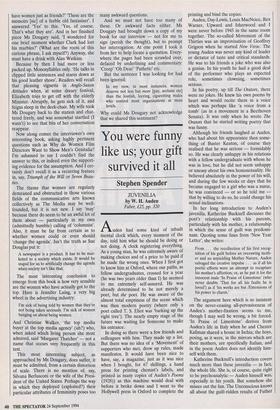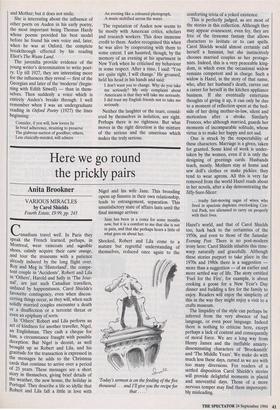You were funny like us; your gift survived it all
Stephen Spender
JUVENILIA by W. H. Auden Faber, £25, pp. 320 Auden had some kind of inbuilt mental clock which, every moment of the day, told him what he should be doing or not doing. A clock registering everything. As a young man, he was extremely aware of making choices and of a price to be paid if he made the wrong ones. When I first got to know him at Oxford, where our paths, as fellow undergraduates, crossed for a year (he was two years older than I) he seemed to me extremely self-assured. He was already determined to be not merely a poet, but the poet. He was aware of the almost total emptiness of the scene which was then modern poetry (where only a poet called T. S. Eliot was 'barking up the right tree'). The nearly empty stage of the future was waiting for Someone to make his entrance.
In doing so there were a few friends and colleagues with him. They made up a list. But there was no idea of a 'Movement' of supporters who met, drew up rules, made manifestos. It would have been nice to have, say, a magazine, just as it was nice when I bought, for 67 shillings, a hand press for printing chemist's labels, and printed as many copies of Auden's Poems (1928)) as this machine would deal with before it broke down and I went to the Hollywell press in Oxford to complete the printing and bind the copies.
Auden, Day-Lewis, Louis MacNeice, Rex Warner, Upward and Isherwood and I were never before 1945 in the same room together. The so-called Movement of the Thirties was an improvisation of Geoffrey Grigson when he started New Verse. The young Auden was never any kind of leader or dictator of taste and critical standards. He was to his friends a joke who was also a genius. In his youth he had a good deal of the performer who plays an expected role, sometimes clowning, sometimes serious.
In his poetry, up till The Orators, there were no jokes. He knew his own poems by heart and would recite them in a voice which was perhaps like 'a voice from a tomb' (as in a movement in a Beethoven Sonata). It was only when he wrote The Orators that he started writing poetry that was funny.
Although his friends laughed at Auden, who had about his appearance then some- thing of Buster Keaton, of course they realised that he was serious — formidably so. He was clearly unhappy in his relations with a fellow undergraduate with whom he was in love, but he did not seem unhappy or uneasy about his own homosexuality. He believed absolutely in the power of his will, and during the few weeks or days that he became engaged to a girl who was a nurse, he was convinced — or so he told me that by willing to do so, he could change his sexual inclinations.
In her long introduction to Auden's juvenilia, Katherine Bucknell discusses the poet's relationship with his parents, particularly with his mother, a relationship in which the sense of guilt was predomi- nant. Quoting some lines from 'New Year Letter', she writes: From .. . the recollection of his first recog- nition of his guilt before an overawing moth- er and an unyielding Mother Nature, Auden salvaged the creative impulse .. . as if all his poetic efforts were an attempt to recapture his mother's affection; or, as he put it for the innocent male 'In Praise of Limestone' (who never doubts 'That for all his faults he is loved') as if 'his works are but /Extensions of his power to charm.'
The argument here which is so insistent on the never-ceasing all-pervasiveness of Auden's mother-fixation seems to me, though I may well be wrong, a bit forced. `In Praise of Limestone' derives from Auden's life in Italy when he and Chester Kailman shared a house in Ischia; the boys, posing, as it were, in the mirrors which are their mothers, are specifically Italian, and in the poem Auden does not identify him- self with them.
Katherine Bucknell's introduction covers much more than these juvenilia — in fact, the whole life. She is, of course, quite right to be psychoanalytic — Auden himself was, especially in his youth. But somehow she misses out the fun. The Unconscious knows all about the guilt-ridden results of Father and Mother; but it does not smile.
She is interesting about the influence of other poets on Auden in his early poetry, the most important being Thomas Hardy whose poems provided his best model before he found his own voice and, later, when he was at Oxford, the complete breakthrough effected by his reading Eliot's The Waste Land.
The juvenilia provide evidence of the young writer's determination to write poet- ry. Up till 1927, they are interesting more for the influences they reveal — first of the Georgian and later of the 'moderns' (begin- ning with Edith Sitwell) — than in them- selves. Then suddenly a voice which is entirely Auden's breaks through. I well remember when I was an undergraduate reading in Oxford Poetry (1927) the lines beginning:
Consider, if you will, how lovers lie In brief adherence, straining to preserve The glabrous suction of goodbye; others, Less clinically-minded, will admire An evening like a coloured photograph, A music stultified across the water.
The reputation of Auden now seems to lie mostly with American critics, scholars and research workers. This does immense credit to them. Auden recognised this when he was alive by cooperating with them to some extent. I am haunted, though, by the memory of an evening at his apartment in New York when he criticised my behaviour in some respect. After a time, I said: 'You are quite right, I will change.' He groaned, held his head in his hands and said:
I don't want you to change. Why do you take me seriously? My only complaint about Americans is that they will take me seriously. I did trust my English friends not to take me seriously.
Neither the laughter or the tears, consid- ered by themselves in isolation, are right. Perhaps there is no rightness. But what moves in the right direction is the mixture of the serious and the unserious which makes the truly serious.



































































 Previous page
Previous page